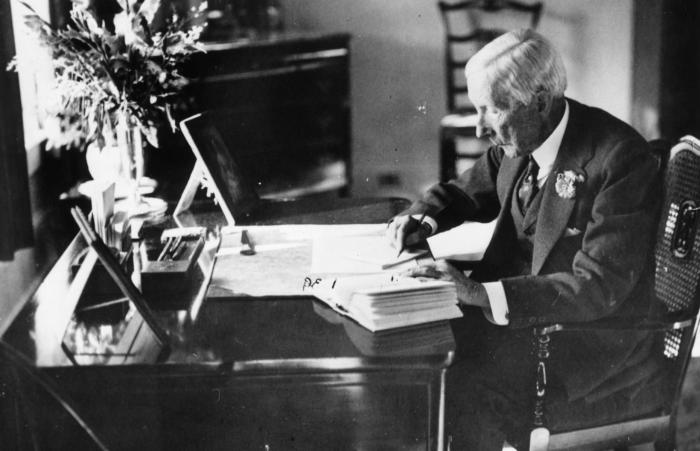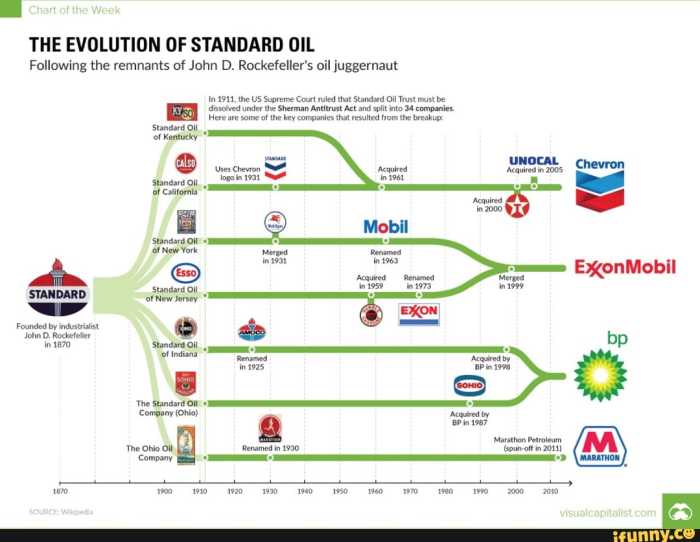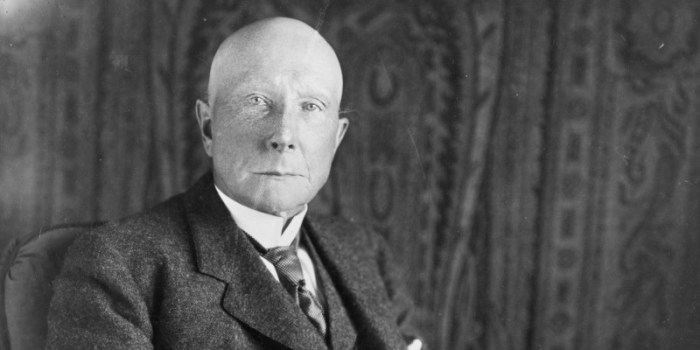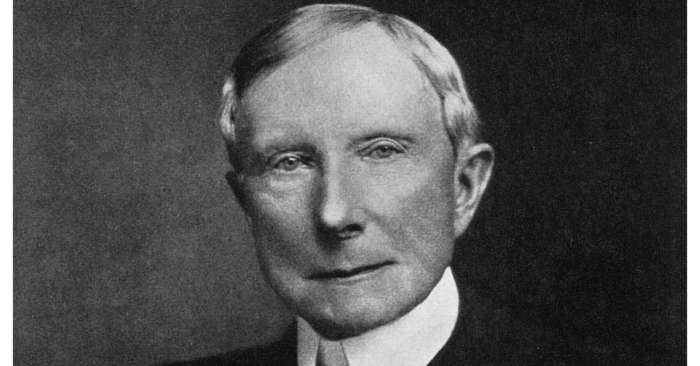John d. rockefeller apush definition – John D. Rockefeller: APUSH Definition and Legacy provides a comprehensive overview of the life, career, and impact of one of the most influential figures in American history. This engaging narrative explores Rockefeller’s early life, business ventures, philanthropic endeavors, and lasting legacy, offering a multifaceted portrait of a complex and controversial individual.
Rockefeller’s journey from humble beginnings to becoming one of the wealthiest and most powerful men in the world is a testament to his ambition, innovation, and ruthlessness. As the founder and head of Standard Oil, he revolutionized the oil industry and amassed an unprecedented fortune.
However, his business practices also drew scrutiny and criticism, leading to accusations of monopoly and unfair competition.
Early Life and Education: John D. Rockefeller Apush Definition

John Davison Rockefeller was born on July 8, 1839, in Richford, New York. He was the son of William Avery Rockefeller, a lumberman and farmer, and Eliza Davison Rockefeller. Rockefeller’s family was devout Baptist, and he was raised in a strict religious environment.
Rockefeller’s early education was limited. He attended a one-room schoolhouse in Richford, and later worked as a clerk in his father’s store. However, he showed a keen interest in business from an early age. In 1853, at the age of 14, Rockefeller left home to work as a bookkeeper in Cleveland, Ohio.
Formal Education
Rockefeller’s formal education ended after his eighth-grade year. However, he continued to educate himself throughout his life. He read widely, and he attended lectures and courses at various colleges and universities. In 1863, he enrolled in the Commercial College of Cleveland, where he studied accounting and business law.
Rockefeller’s education had a profound influence on his career. He learned the importance of hard work, thrift, and attention to detail. He also developed a strong understanding of business principles, which he would later use to build his vast fortune.
Standard Oil Company

The Standard Oil Company was founded in 1870 by John D. Rockefeller and several partners. The company quickly grew to become the largest oil company in the world, controlling over 90% of the oil refining capacity in the United States.
Rockefeller’s business strategies, which included vertical integration and aggressive competition, played a major role in the company’s success.
Business Strategies
One of Rockefeller’s key business strategies was vertical integration. He sought to control every aspect of the oil industry, from exploration and production to refining, transportation, and marketing. This allowed Standard Oil to reduce costs and increase efficiency.
Another strategy Rockefeller employed was aggressive competition. He used predatory pricing and other tactics to drive competitors out of business. In some cases, he even bought out competitors and then closed their refineries.
Impact on the Oil Industry, John d. rockefeller apush definition
Rockefeller’s business strategies had a profound impact on the oil industry. Vertical integration allowed Standard Oil to dominate the market and control prices. Aggressive competition eliminated many smaller competitors, creating a near-monopoly.
Controversy
Standard Oil’s monopoly was highly controversial. Critics accused Rockefeller of using unfair business practices and stifling competition. In 1911, the Supreme Court ordered Standard Oil to be broken up into 34 smaller companies.
Philanthropy

John D. Rockefeller was a prominent philanthropist who dedicated a significant portion of his wealth to charitable causes. His philanthropic activities were extensive, spanning various sectors and leaving a lasting impact on society.
Rockefeller’s charitable work was primarily motivated by his religious beliefs and a desire to make a difference in the world. He believed that wealth carried with it a responsibility to give back to society and that philanthropy was a means to address social problems and improve the lives of others.
Educational Institutions
- Established the University of Chicago (1890): Rockefeller played a pivotal role in the founding and development of the University of Chicago, providing substantial funding and shaping its educational mission.
- Supported numerous other educational institutions: Rockefeller also made significant contributions to institutions like Spelman College, Tuskegee Institute, and the Rockefeller Institute for Medical Research, fostering education and research in various fields.
Medical Research and Public Health
- Established the Rockefeller Institute for Medical Research (1901): Rockefeller founded this renowned research institution dedicated to advancing medical knowledge and combating diseases, leading to groundbreaking discoveries and advancements in medicine.
- Supported public health initiatives: Rockefeller provided funding for public health campaigns, including efforts to combat hookworm disease and improve sanitation, significantly improving the health and well-being of communities.
Arts and Culture
- Founded the Museum of Modern Art (MoMA) (1929): Rockefeller was a major patron of the arts and established MoMA as a leading institution for the exhibition and appreciation of modern art.
- Supported other cultural initiatives: Rockefeller also contributed to the construction of Lincoln Center for the Performing Arts and the restoration of Williamsburg, Virginia, preserving and promoting cultural heritage.
Social Welfare
- Established the Rockefeller Foundation (1913): This philanthropic organization has played a significant role in supporting various social causes, including education, public health, and international development.
- Supported organizations addressing social issues: Rockefeller provided funding to organizations like the NAACP and the National Urban League, advocating for civil rights and social justice.
Rockefeller’s philanthropy had a profound impact on society. His contributions to education, medical research, public health, arts and culture, and social welfare have left a lasting legacy, benefiting generations and shaping the development of various fields. His philanthropic endeavors serve as a testament to the power of wealth and the responsibility of individuals to use their resources for the greater good.
Personal Life and Legacy

Rockefeller’s personal life was marked by strong family values and religious beliefs. He married Laura Celestia Spelman in 1864, and they had five children together. Rockefeller was a devoted husband and father, and he instilled in his children the importance of hard work, thrift, and philanthropy.
Rockefeller’s religious beliefs played a significant role in his life and actions. He was a devout Baptist, and he believed that his wealth was a gift from God that should be used to help others. Rockefeller’s philanthropy was extensive, and he donated millions of dollars to support education, healthcare, and religious organizations.
Legacy
Rockefeller’s legacy is complex and multifaceted. He is remembered as one of the most successful businessmen in American history, but he is also criticized for his ruthless business practices. Rockefeller’s philanthropy has had a lasting impact on the world, and he is considered one of the greatest philanthropists in history.
- As a businessman, Rockefeller revolutionized the oil industry and played a major role in the development of the American economy. He was a ruthless competitor, but he also had a keen eye for innovation and efficiency.
- As a philanthropist, Rockefeller’s donations had a profound impact on education, healthcare, and the arts. He established the Rockefeller Foundation, which continues to support charitable causes around the world.
FAQ Explained
What was John D. Rockefeller’s role in the development of the oil industry?
As the founder and head of Standard Oil, John D. Rockefeller played a pivotal role in the development of the American oil industry. He introduced innovative refining techniques, established a vast network of pipelines and distribution channels, and consolidated control over much of the industry, revolutionizing the production and distribution of oil.
What were the main criticisms of Standard Oil’s business practices?
Standard Oil was criticized for its aggressive tactics, including predatory pricing, exclusive contracts, and the use of rebates to stifle competition. These practices led to accusations of monopoly and unfair competition, and ultimately resulted in the breakup of the company in 1911.
How did John D. Rockefeller’s philanthropy impact American society?
Rockefeller’s philanthropy had a profound impact on American society. He established numerous foundations and institutions dedicated to education, healthcare, and the arts. His donations helped to establish the University of Chicago, the Rockefeller Institute for Medical Research, and the Museum of Modern Art, among other notable institutions.